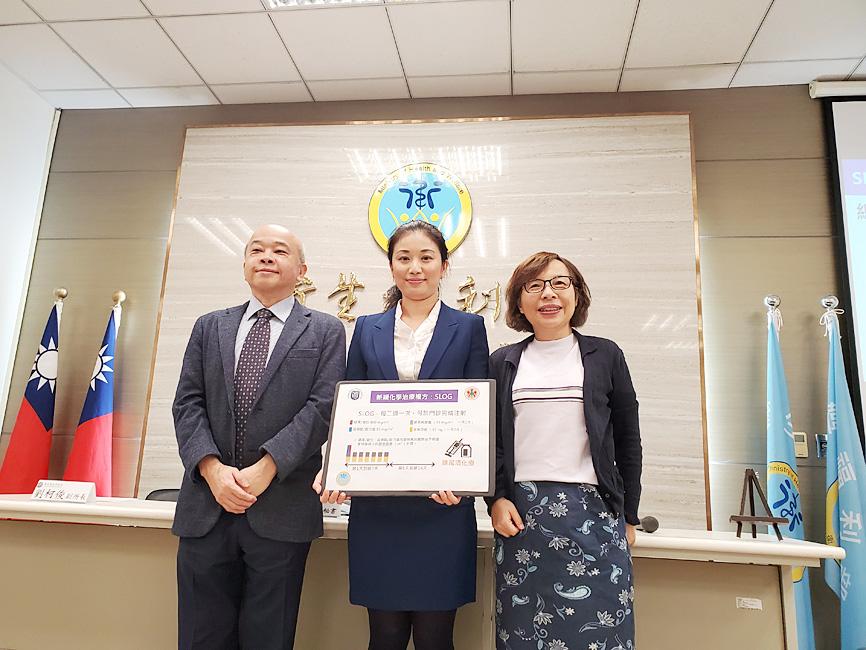The National Health Research Institutes (NHRI) has developed a combination chemotherapy regimen to treat pancreatic cancer that reduces the side effects and extends survival to nearly a year, it said yesterday.
An institute research team’s phase 1 and 2 clinical trials on a chemotherapy regimen of S-1, leucovorin, oxaliplatin and gemcitabine (SLOG) showed promising efficacy and safety in treating patients with metastatic pancreatic ductal adenocarcinoma (PDAC), National Institute of Cancer Research associate investigator Chiang Nai-jung (姜乃榕) said.
PDAC is a highly fatal disease, and as pancreatic cancers often do not show symptoms early in their onset, they are often only detected after they have grown large or spread outside the pancreas, meaning that 80 to 85 percent of patients are in the advanced stages of the disease at their time of diagnosis, Chiang said.

Photo: Lin Hui-chin, Taipei Times
The overall five-year survival rate of PDAC is lower than 5 percent, and systemic chemotherapy is the standard treatment for patients with unresectable advanced or metastatic pancreatic cancer, she said.
The median overall survival of patients with metastatic pancreatic cancer who received first-line gemcitabine monotherapy is three to six months, but newer combination chemotherapy regimens — such as folinic acid (also known as leucovorin), fluorouracil, irinotecan and oxaliplatin (FOLFIRINOX), and nab-paclitaxel plus gemcitabine (AG) — extended the median overall survival to about eight-and-a-half to 11 months, Chiang said.
Although FOLFIRINOX and AG are more effective than monotherapy, they are associated with a higher degree of hematological toxicity and neutropenia, especially in Asians, she said, adding that their team tried to find other regimens better suited for Asian patients.
Some patients are less willing to tolerate the side effects of chemotherapy, but reducing the chemotherapy dosage might also reduce its efficacy, so the institute has been pursuing better solutions for several years, National Institute of Cancer Research deputy director Liu Ko-jiunn (劉柯俊) said.
The researchers spent four years coming up with the SLOG regimen — a fixed-rate infusion (10mg/m2 per minute) of 800mg/m2 of gemcitabine, followed by 85mg/m2 of oxaliplatin once per two weeks, and an oral dosage of S-1 and 20mg/m2 of leucovorin twice per day in the first seven days of a two-week cycle, Chiang said, adding that it can be used as a first-line treatment for PDAC.
With assistance from the Taiwan Cooperative Oncology Group, National Cheng Kung University Hospital, National Taiwan University Hospital, Linkou Chang Gung Memorial Hospital and Kaohsiung Medical University Chung-Ho Memorial Hospital, a total of 73 patients participated in the two phases of clinical trials.
Researchers found that the median overall survival of patients on the SLOG regimen was 11.4 months, the tumor shrinkage rate was above 30 percent, and the gastrointestinal side effects and rates of neutropenia were also reduced, Chiang said.
The biweekly treatment is a feasible regimen with promising effects and safety for patients with advanced PDAC, and it has been included in the clinical practice guidelines in several hospitals, she said.
The researchers are conducting a randomized phase 2 clinical trial comparing SLOG with a modified FOLFIRINOX regimen in patients with advanced pancreatic cancer, Chiang said.
The team’s research was published in the European Journal of Cancer last month.

The Central Weather Administration (CWA) today issued a sea warning for Typhoon Fung-wong effective from 5:30pm, while local governments canceled school and work for tomorrow. A land warning is expected to be issued tomorrow morning before it is expected to make landfall on Wednesday, the agency said. Taoyuan, and well as Yilan, Hualien and Penghu counties canceled work and school for tomorrow, as well as mountainous district of Taipei and New Taipei City. For updated information on closures, please visit the Directorate-General of Personnel Administration Web site. As of 5pm today, Fung-wong was about 490km south-southwest of Oluanpi (鵝鑾鼻), Taiwan's southernmost point.

Tropical Storm Fung-Wong would likely strengthen into a typhoon later today as it continues moving westward across the Pacific before heading in Taiwan’s direction next week, the Central Weather Administration (CWA) said. As of 8am, Fung-Wong was about 2,190km east-southeast of Cape Oluanpi (鵝鑾鼻), Taiwan’s southernmost point, moving westward at 25kph and possibly accelerating to 31kph, CWA data showed. The tropical storm is currently over waters east of the Philippines and still far from Taiwan, CWA forecaster Tseng Chao-cheng (曾昭誠) said, adding that it could likely strengthen into a typhoon later in the day. It is forecast to reach the South China Sea

Almost a quarter of volunteer soldiers who signed up from 2021 to last year have sought early discharge, the Legislative Yuan’s Budget Center said in a report. The report said that 12,884 of 52,674 people who volunteered in the period had sought an early exit from the military, returning NT$895.96 million (US$28.86 million) to the government. In 2021, there was a 105.34 percent rise in the volunteer recruitment rate, but the number has steadily declined since then, missing recruitment targets, the Chinese-language United Daily News said, citing the report. In 2021, only 521 volunteers dropped out of the military, the report said, citing

Nearly 5 million people have signed up to receive the government’s NT$10,000 (US$322) universal cash handout since registration opened on Wednesday last week, with deposits expected to begin tomorrow, the Ministry of Finance said yesterday. After a staggered sign-up last week — based on the final digit of the applicant’s national ID or Alien Resident Certificate number — online registration is open to all eligible Taiwanese nationals, foreign permanent residents and spouses of Taiwanese nationals. Banks are expected to start issuing deposits from 6pm today, the ministry said. Those who completed registration by yesterday are expected to receive their NT$10,000 tomorrow, National Treasury